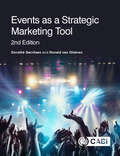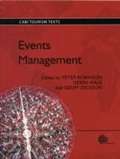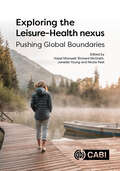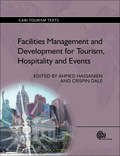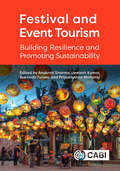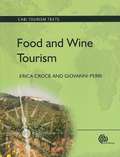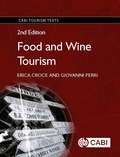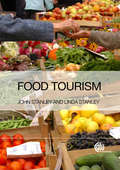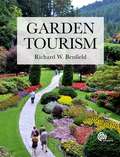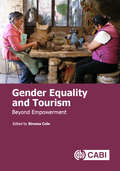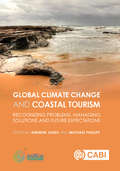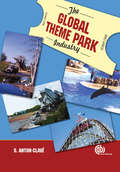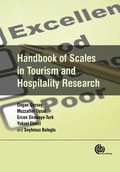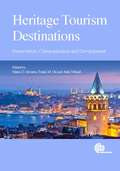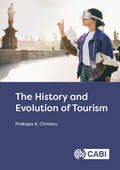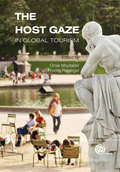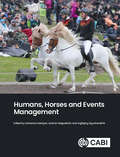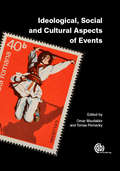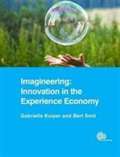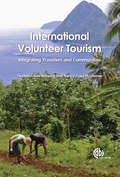- Table View
- List View
Events as a Strategic Marketing Tool (Tourism Studies)
by Dorothé Gerritsen Ronald van OlderenEvents have come to play an ever-growing role in marketing; by connecting products and services with experiences and vice versa, producers can create important added value. Events as a Strategic Marketing Tool, 2nd edition describes how events can be used as a strategic tool in marketing practices. Fully updated and with new case studies throughout, this second edition reviews the way organizations use events to connect with their visitors. It covers the development of the experience economy, the steps from strategy to concept, event design and touchpoints. It also considers the areas of marketing within which experiences play a role, such as branding, relationship marketing and city marketing. Concluding with a chapter on effect measurement and evaluation, and including a wealth of internationally relevant examples, the book gives a thorough insight into the way events can help reach strategic marketing goals. With coverage of a wide range of marketing areas, the book also includes content on cutting-edge topics such as neuromarketing, providing students with a comprehensive introduction to using events as part of the marketing mix. Contains numerous international examples that showcase the variety of ways that events can be used A wealth of images illustrate the theory, helping students to visualize concepts and improve understanding. This new edition provides an engaging resource for both students and professionals interested in leisure, tourism and events.
Events Management
by Steve Gelder Caroline Wiscombe Ade Oriade Sine Heitmann Peter Robinson Andrew Ridal Crispin Dale Christine Roberts Ghislaine Povey Geoff Dickson Debra WaleEvent management studies are fast growing in popularity, covering a diverse range of activities such as music and film festivals, concerts, sporting events and conferences. This textbook gives a broad and practical coverage of the major themes in events. Outlining both the historical developments and current state of the industry, whilst also taking into account wider political and cultural issues, the book covers the different elements of planning, project management, health and safety, funding, operations, human resources, marketing and logistics that are vital for successful management. Critical issues such as impacts, sustainability and legacy of events are also discussed. Supported by international case studies and review questions, Events Management provides a current and up-to-date view of the industry in this field.
Exploring the Leisure - Health Nexus: Pushing Global Boundaries
by Lynn Anderson Holly Bowen-Salter Nina Burridge Simon Darcy Katherine Dashper Christina Davies Leila Gholizadeh Simone Grabowski Tonia Gray Sara Karacsony Alexis Marcoux Rouleau Danielle McDonald Annette Michelsen Cour Emma Milanese Torben Nielsen Carmel Nottle Jenny Onyx Michelle O’Shea Victoria Paraschak Sonya Pearce Melanie Pescud Arianne Reis Joyce Simard Zoei SuttonBy exploring past, current, and future intersections between leisure and health, this book considers research and academic thought to reveal and critique the nuanced ways that leisure impacts health as well as considering how health professions use leisure as a 'tool'. Aided by the diverse chapters, readers will be challenged to explore future intersections between leisure and health using an overarching eco (ecological/environmental), bio(biological), psycho (psychological), social (sociological) lens. Many of the chapters include case-studies which consider further developing leisure and health themes, particularly in relation to a number of emerging environmental, health and societal challenges that confront the world. In addition, the book: ·Is cross disciplinary and demonstrates non-individualized framing of health (as per the WHO definition) giving readers a unique opportunity to develop an understanding of sociological frameworks, including ecobiopyschosocial, salutogenic, multi-species and criticalist. ·Moves readers from an individual level understanding of interconnections between leisure and health through to a consideration of global issues (including a section on the impact and consequences of Covid-19). ·Examines the nexus between leisure and health through a focus on a number of population groups including First Nations peoples, women, incarcerated people, migrants, people with disabilities, older people, and the human-animal interface. The book will be of significant interest to researchers/academics/practitioners in the leisure, health, sport, tourism, recreation, events, social science, and arts disciplines.
Facilities Management and Development for Tourism, Hospitality and Events
by Dimitri Tassiopoulos Michael Conlin Mohamed Hawela Bryn Parry Kamil Yagci Neil Robinson Azilah Kasim J. Stephen Taylor Ahmed Hassanien Sonia Gupta Crispin Dale Dr Abel Alonso Shuna Marr Peter RobinsonFacilities planning for tourism, hospitality and events (THE) is an important subject from both theoretical and applied perspectives, as land, property and resources represent major components of the foundation of the industry. As future managers, it is imperative that students have a sound basic knowledge of property and the various resources, systems and services associated with it. Covering important contemporary subjects such as sustainable planning and environmental management, this book considers the planning, development and management of facilities operations from several key perspectives, drawing upon the expertise of complementary experts in the design, management and development of THE facilities.
Festival and Event Tourism: Building Resilience and Promoting Sustainability
by Edited by Anukrati Sharma, Jeetesh Kumar, Bakhodir Turaev, Priyakrushna MohantyFestivals and events vary from small, neighbourhood celebrations through to mega gatherings, and both can be attractive to tourists. They come with their own unique challenges and opportunities however, which means destinations must carefully consider their responsibility to local people, and host them in a sustainable manner. Divided into four sections, this book covers the sustainability, community involvement and destination-marketing aspects of festivals and events. This book: - Reviews the common trends, trajectories and competition in the event tourism market. - Discusses the role of event organizers in ensuring the sustainability of events and their destinations, including green activities and cultural preservation. - Considers the role of the community in achieving sustainability through volunteerism, heritage conservation and ensuring events boost community spirit. Covering important issues such as the marketing, branding and promotion of events, this book also unravels the opportunities and challenges associated with sustainable festivals and events. It uses an array of case studies and a global author team to provide an important resource for tourism and event researchers and professionals.
Food and Wine Tourism: Integrating Food, Travel and Territory
by Giovanni Perri Erica CroceIn this cultural, thematic, integrated and sustainable form of tourism, the spirit of a place can be sampled on a plate and experienced directly through tours and visits to producers. If food and wine tourism is well planned, managed and controlled, it can become a real economic resource. This text explores how food producing regions present themselves to tourists experiencing the culture, history and ambience of a location through the food and wine it produces. The book takes a practical approach, discussing how to establish a food-related tourism destination, how to evolve from purely a food producer to a tourism operator. It also covers management practices such as producing marketing material, and considerations of sustainability and quality assessment. This book is adapted with an international focus from Croce, E. and Perri, G. (2008) "Il turismo enogastronomico. Progettare, gestire, vivere l'integrazione tra cibo, viaggio, territorio", FrancoAngeli s.r.l., Milano, Italy
Food and Wine Tourism: Integrating Food, Travel and Terroir (CABI Tourism Texts)
by Erica Croce Giovanni PerriThis established textbook explores how regions, and food industry, travel and hospitality companies present themselves to tourists experiencing the culture, history and ambience of a location through the food and wine it produces. It provides practical suggestions and guidelines for establishing a food-related tourism destination and business, discussing the environment, understanding the food tourist, supply issues, tours and tasting sessions, themed itineraries, planning and developing the tourist product, marketing and best practice strategies. It also includes numerous case studies from around the world and plentiful pedagogical features to aid student learning. The second edition: - Contains updated chapters throughout, to form a complete and current overview of food and wine tourism. - Reviews new emerging destinations, and food and wine tourism from a business perspective. - Includes new global case studies discussing aspects such as transforming an Indian area into a wine-producing region, promoting a destination through a social media campaign, chocolate tourism in Belize, planning an international food fair, and making San Francisco a food capital. - Presents successful international professionals' experiences and tips, catching trends and setting the tourism phenomenon in an even more international context. If food and wine tourism is well planned, managed and controlled, it can become a real economic resource. Suitable for students in tourism and leisure subjects, the practical application provided in this book also makes it an ideal resource for those operating in the food and wine sector.
Food Tourism
by Linda Stanley John StanleyThe fastest growth in tourism is the culinary sector. Covering farmers markets, taste tours, agri-entertainment, glamping, restaurants, farm shops and more, food tourism has become both an important part of holidaying and a purpose in itself. With growth occurring in most developed countries and tourists searching out culinary tourism throughout the world, this book provides an overall direction to the development of food tourism and a section on the future of this trend.
Food Tourism: A Practical Marketing Guide
by John Stanley Linda StanleyThe fastest growth in tourism is the culinary sector. Covering farmers markets, taste tours, agri-entertainment, glamping, restaurants, farm shops and more, food tourism has become both an important part of holidaying and a purpose in itself. With growth occurring in most developed countries and tourists searching out culinary tourism throughout the world, this book provides an overall direction to the development of food tourism and a section on the future of this trend.
Garden Tourism
by Richard W BenfieldGarden visitation has been a tourism motivator for many years and can now be enjoyed in many different forms. Private garden visiting, historical garden tourism, urban gardens, and a myriad of festivals, shows and events all allow the green-fingered enthusiast to appreciate the natural world. This book traces the history of garden visitation and examines tourist motivations to visit gardens. Useful for garden managers and tourism students as well as casual readers, it also examines management and marketing of gardens for tourism purposes, before concluding with a detailed look at the form and tourism-based role of gardens in the future.
Gender Equality and Tourism: Beyond Empowerment
by Stroma Cole Lucy Ferguson Daniela Moreno Alarcón Carlos Costa Marília Durão Zélia Breda Fiona Eva Bakas Paola Vizcaino Suárez Belén Martínez Caparrós Meghan Muldoon Wendy Wendy Kylie Radel Heather Jeffrey Isis Arlene Díaz-Carrión Hazel Tucker Inês CarvalhoDoes tourism empower women working in and producing tourism? How are women using the transformations tourism brings to their advantage? How do women, despite prejudice and stereotypes, break free, resist and renegotiate gender norms at the personal and societal levels? When does tourism increase women's autonomy, agency and authority? The first of its kind this book delivers: A critical approach to gender and tourism development from different stakeholder perspectives, from INGOs, national governments, and managers as well as workers in a variety of fields producing tourism. Stories of individual women working across the world in many aspects of tourism. A foreword by Margaret Bryne Swain and contributions from academics and practitions from across the globe. A lively and accessible style of writing that links academic debates with lived realities while offering hope and practical suggestions for improving gender equality in tourism. Gender Equality and Tourism: Beyond Empowerment, a critical gendered analysis that questions the extent to which tourism brings women empowerment, is an engaging and thought-provoking read for students, researchers and practitioners in the areas of tourism, gender studies, development and anthropology. To access a presentation delivered by Stroma Cole as well as an interview with her, please visit http://www.cabi.org/openresources/94422
Gender Equality and Tourism: Beyond Empowerment
by Lucy Ferguson Daniela Moreno Alarcón Carlos Costa Marília Durão Zélia Breda Fiona Eva Bakas Paola Vizcaino-Suárez Belén Martínez Caparrós Meghan Muldoon Wendy Wendy Kylie Radel Heather Jeffrey Isis Arlene Díaz-Carrión Hazel Tucker Inês CarvalhoDoes tourism empower women working in and producing tourism? How are women using the transformations tourism brings to their advantage? How do women, despite prejudice and stereotypes, break free, resist and renegotiate gender norms at the personal and societal levels? When does tourism increase women's autonomy, agency and authority? The first of its kind this book delivers: A critical approach to gender and tourism development from different stakeholder perspectives, from INGOs, national governments, and managers as well as workers in a variety of fields producing tourism. Stories of individual women working across the world in many aspects of tourism. A foreword by Margaret Bryne Swain and contributions from academics and practitions from across the globe. A lively and accessible style of writing that links academic debates with lived realities while offering hope and practical suggestions for improving gender equality in tourism. Gender Equality and Tourism: Beyond Empowerment, a critical gendered analysis that questions the extent to which tourism brings women empowerment, is an engaging and thought-provoking read for students, researchers and practitioners in the areas of tourism, gender studies, development and anthropology. To access a presentation delivered by Stroma Cole as well as an interview with her, please visit http://www.cabi.org/openresources/94422
Global Climate Change and Coastal Tourism
by Andrew Jones Michael PhillipsClimate Change and Coastal Tourism includes case studies on climate change and coastal tourism that explore current threats to and consequences of climate change on existing tourism coastal destinations. It assesses management and policy options for the future sustainability of threatened tourism coastal destinations. The cases discussed are from all regions of the world: Europe, The Americas, Asia, Africa, and Australasia. The book synthesize findings to make recommendations that can be used to promote strategies that ameliorate projected impacts of climate change on coastal tourism infrastructure and in turn promote the future sustainability of coastal tourism destinations.
Global Climate Change and Coastal Tourism: Recognizing Problems, Managing Solutions and Future Expectations
by Abdullah Akbas Nazan An Angela Anthonisz Paulo Borges Stephen William Boyd Huong T. Bùi Jeremy Buultjens Helena Calado Rita Cannas Salvador Anton Clavé James Andrew Cooper Janice Cumberbatch Osman Cenk Demiroglu Denyse S. Dookie Danielle EdwardsClimate Change and Coastal Tourism includes case studies on climate change and coastal tourism that explore current threats to, and consequences of, climate change on existing tourism coastal destinations. It assesses management and policy options for the future sustainability of threatened tourism coastal destinations. The cases discussed are from all regions of the world - Europe - The Americas - Asia - Africa -Australasia and synthesise findings to make recommendations that can be used to promote strategies that ameliorate projected impacts of climate change on coastal tourism infrastructure - and in turn promote the future sustainability of coastal tourism destinations.
Global Theme Park Industry
by Salvador Anton ClavéSince the 1980s, the theme park industry has developed into a global phenomenon, with everything from large, worldwide theme parks to countless smaller ventures. From the first pleasure gardens to the global theme park companies, this book provides an understanding of the nature and function of theme parks as spaces of entertainment. Illustrated throughout by worldwide case studies, empirical data and practical examples, the book portrays the impacts of theme parks as global competitive actors, agents of global development and cultural symbols, particularly in the context of their role in the developing experience economy.In conclusion, this book is a practical guide to the planning and development of theme parks.
Handbook of Scales in Tourism and Hospitality Research
by Seyhmus Baloglu Ercan Sirakaya-Turk Muzaffer Uysal Yuksel Ekinci Dogan GursoyAs the field of tourism and hospitality experiences maturity and scientific sophistication, researchers need to fully understand the breadth and depth of existing scales that help explain, understand, monitor, and predict not only behaviour but also consequences of such behaviour as a function of demand and supply interactions in the field. By introducing the importance of measurement and scales and providing groupings of existing scales The Handbook of Scales in Tourism and Hospitality Research serves as the state of the art reference book in the field of tourism, hospitality and allied fields such leisure, recreation, and services management.
Heritage Tourism Destinations: Preservation, Communication and Development
by Atila Yüksel Maria Alvarez Frank GoHeritage tourism is tied to myth making and stories; creative content that can be shared, stored, combined and manipulated, but that depends on a unique cultural or natural history. A significant section of the wider phenomenon that is cultural tourism, heritage tourism is a demand-driven industry that continues to be a subject of heated debate in academic circles. Beginning with an overview of the subject, this book considers the conservation and revitalization of heritage destinations, as well as the role local communities have in supporting an attraction. It then discusses product development and communication around the world, using new techniques such as social media and examples from food tourism and sporting events, before a final section reviews the planning and institutionalisation of heritage spaces. A timely conclusion subsequently considers the implications of developments such as globalisation, technological improvement and climate change upon these unique destinations. A valuable addition to the literature, this book is the first to bridge the gap between theory and practice, including the latest research and international case studies for researchers and practitioners in tourism and destination management.
Heritage Tourism Destinations: Preservation, Communication and Development
by Maria D. Alvarez Frank M. Go Atila YükselHeritage tourism is tied to myth making and stories; creative content that can be shared, stored, combined and manipulated, but that depends on a unique cultural or natural history. A significant section of the wider phenomenon that is cultural tourism, heritage tourism is a demand-driven industry that continues to be a subject of heated debate in academic circles. Beginning with an overview of the subject, this book considers the conservation and revitalization of heritage destinations, as well as the role local communities have in supporting an attraction. It then discusses product development and communication around the world, using new techniques such as social media and examples from food tourism and sporting events, before a final section reviews the planning and institutionalisation of heritage spaces. A timely conclusion subsequently considers the implications of developments such as globalisation, technological improvement and climate change upon these unique destinations. A valuable addition to the literature, this book is the first to bridge the gap between theory and practice, including the latest research and international case studies for researchers and practitioners in tourism and destination management.
The History and Evolution of Tourism
by Dr Prokopis A ChristouThis book provides an overview of the history and evolution of tourism to the present, and speculates on possible and probable change into the future. It discusses significant travel, tourism and hospitality events while referring to tourism-related notions and theories that have been developed since the beginnings of tourism. Its scope moves beyond a comprehensive historical account of facts and events. Instead, it bridges these with contemporary issues, challenges and concerns, hence enabling readers to connect tourism past with the present and future. This textbook aspires to enhance readers' comprehension of the perplexed system of tourism, promoting decision-making and even the development of new theories. Despite its academic orientation, the book is written in an approachable style enabling a clear and solid understanding of how tourism has evolved through the centuries. It uses several practitioner-linked, real-life examples and case studies derived from organizations and enterprises across all aspects of the tourism, travel and events industries. This book will be of great interest to academics, practitioners and students from a wide variety of disciplines, including tourism, hospitality, events, sociology, psychology, philosophy, history and human geography.
The Host Gaze in Global Tourism
by Yvette Reisinger Omar MoufakkirMost tourism theories have been developed from the tourists' perspective, including the seminal work by John Urry, 'The Tourist Gaze', which is now a classic text. The Host Gaze in Global Tourism is a unique book for researchers and students as it is the first to look at the host gaze from within the host community. It discusses how the gaze is constructed, how it has developed, how it varies between countries and how the tourism industry can affect it. By looking at the gazes of both Western and non-Western hosts, this book analyses the dynamics of a host destination and consequences the gaze can have upon the tourist.
Humans, Horses and Events Management
by Katherine Dashper Guðrún Helgadóttir Ingibjörg SigurðardóttirHorses are perhaps the most common non-human animal to feature in planned events, but although there is considerable research on equestrian sport, there is virtually none on equestrian events. This book begins to address this gap, using the National Championships of the Icelandic Horse as an extended case study to explain in depth the process of managing an event, as well as the larger theoretical implications of events management. Drawing on diverse viewpoints and theoretical perspectives, the book draws wider comparisons to connect events management to larger themes in the social sciences, such as human-animal relations; nationalism; place branding; event impacts; event experience; and inclusion and exclusion. The book is a contribution to two fields. In relation to human-animal studies, it focuses on how the Icelandic horse breed is marketed and celebrated through top-tier competition; whereas from an events management perspective, it considers the role of the event in community building, the practical and theoretical aspects of running a sustainable equestrian event, and the issues that arise in multispecies event contexts. This book: - Uniquely draws together events management and human-animal studies. - Is formed from empirical research conducted by a multinational team of events management and tourism researchers. - Uses a single, extended case study to explore a range of themes and issues, both empirically and theoretically. A valuable resource for researchers of events management, human-animal studies and tourism, this book also provides an in-depth look at end-to-end events management for industry professionals.
Ideological, Social and Cultural Aspects of Events
by Omar MoufakkirThere is an ever growing importance of events in modern society and until now existing literature on events has been dominated by the economic perspective. Social and Cultural Aspects of Events addresses the social and cultural side of events and explores the role they have in fostering change and community development. It examines the transformatory function of events in the context of development studies - as phenomena that can promote and facilitate human development, including social, societal and individual change. This book provides vital and timely exploration and encourages the study of more diverse themes within event management.
Imagineering: Innovation in the Experience Economy
by Gabrielle Kuiper Bert SmitTo survive in today's complex economies, it is imperative for companies to understand their consumers in terms of how and why they like to use their products. Distinction based on quality no longer provides competitive advantage. Imagineers use design methods to create meaningful experiences that connect consumers to brands, employees to companies and consumers to consumers. This book explains the background of the need for experiences and then focusses on how to design them. Bringing theory into practice for students of tourism marketing, event planning and business, it provides a window into the creative world of Imagineering.
International Volunteer Tourism
by Stephen Wearing Nancy Gard McgeheeVolunteer tourism has increased in popularity and prevalence and is no longer considered only a small section of alternative tourism. It is now part of the mainstream tourism industry and tourism experience for many people. Concentrating on the experience of the volunteer tourist and the host community, this new book builds on the view of volunteer tourism as a positive and sustainable form of tourism to examine a broader spectrum of behaviours and experiences and consider critically where the volunteer tourist experience both compliments and collides with host communities, using multiple case studies.
International Volunteer Tourism: Integrating Travellers and Communities
by Stephen Wearing Nancy Gard McGeheeVolunteer tourism has increased in popularity and prevalence and is no longer considered only a small section of alternative tourism. It is now part of the mainstream tourism industry and tourism experience for many people. Concentrating on the experience of the volunteer tourist and the host community, this new book builds on the view of volunteer tourism as a positive and sustainable form of tourism to examine a broader spectrum of behaviours and experiences and consider critically where the volunteer tourist experience both compliments and collides with host communities, using multiple case studies.
